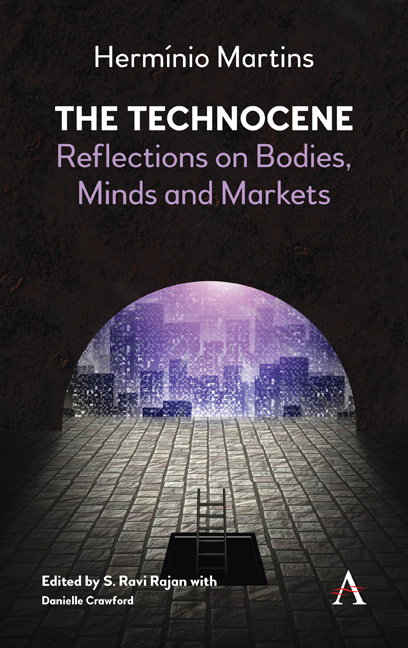Book contents
- Frontmatter
- Dedication
- Contents
- Preface
- Editor's Introduction: Hermínio Martins and the Technocene
- Chapter One The Technocene: On Bodies, Minds and Markets
- Chapter Two Technology Sublime: Paths to the Post-Human
- Chapter Three Perpetual Augmentation: From Eugenics to Human Genetic Capitalism
- Chapter Four The Body Vanishes! Momenta of Discarnation in Technoscience Today
- Chapter Five When Universities Become Body-Shops
- References
- Index
Chapter Five - When Universities Become Body-Shops
Published online by Cambridge University Press: 12 February 2019
- Frontmatter
- Dedication
- Contents
- Preface
- Editor's Introduction: Hermínio Martins and the Technocene
- Chapter One The Technocene: On Bodies, Minds and Markets
- Chapter Two Technology Sublime: Paths to the Post-Human
- Chapter Three Perpetual Augmentation: From Eugenics to Human Genetic Capitalism
- Chapter Four The Body Vanishes! Momenta of Discarnation in Technoscience Today
- Chapter Five When Universities Become Body-Shops
- References
- Index
Summary
Sorry: your soul has just died.
Car bumper sticker
News from the rat race: the rats have won!
Tom Wolfe
The recent trend, by both Labour and Conservative governments, to substantially increase university tuition fees in the UK does not spring solely from the need to address the financial crisis in higher education. It is driven also by the sense that British universities, or at least some of them, must move towards a US exemplar/ myth/ utopia of the ‘world-class research university’, or some version of it, though no clear specification of the goal-state or even of a spectrum of scenarios, appears to have been published as yet. I am not sure whether many, or indeed any, of the distinguished academic backers and co-instigators of this drive share the brutal judgment expressed recently by a former Labour minister of education, resident in recent years in Cambridge, Massachusetts, that Britain does not currently possess a single ‘world-class’ university or multiversity, Britain having presumably slipped down into this outer darkness at some oddly undisclosed point in the recent, or perhaps not-so-recent, past. In fact, a ranking of 500 world universities and 100 European universities, prepared by a team at the Shiao Jong University of Shanghai, shows that Britain, as of 2003, was doing very well indeed in the number of universities in fairly high places on the list, in having two universities in the top ten (so part of the la crème de la crème), and four in the top twenty.
My concern here is not with the question of the comprehensiveness and equity of access to universities supposedly ensured by the new financial arrangements, important as it is, or with the ‘output’ so unengagingly described by the Financial Times in commending these proposals editorially, as nothing more than improved ‘intellectual skills of the workforce’ (2004). For which purpose, surely, you do not really need universities at all, let alone ‘elite universities’, as the FT calls them, and it is worth noting that this proverbial ‘mouthpiece of capitalism’ eschews any additional reference to such desiderata, if not sheer requisites, of a healthy democracy as a well-educated citizenry.
- Type
- Chapter
- Information
- The TechnoceneThe Technocene Reflections on Bodies, Minds and Markets, pp. 159 - 186Publisher: Anthem PressPrint publication year: 2018



